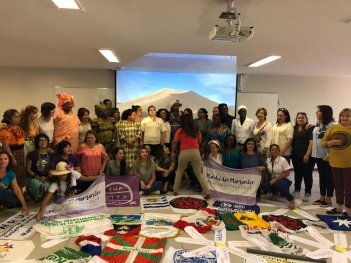March 8, 2020.- On International Women’s Day, women family farmers, peasants and indigenous women demand that their situation be improved and that the fundamental role of women in the sustainable development of communities and rural territories be made visible. Women from all over the world created a joint strategy to contribute to gender equity in family farming and the empowerment of women at an international meeting held in the framework of the March of the Margaridas in Brasilia in August 2019.
Under the slogan #TogetherWeAreStronger, this articulation of women, workers in the fields, forests and water, has a bearing on the need to continue strengthening the capacities of rural women to gain their space and contribute to the development of public policies that address their own challenges.
“It is the rural women who, through their work, both in the production of healthy food from family, peasant and indigenous farming, as well as at home and in caring for the family, guarantee life in the territories”, states Laura Lorenzo, Deputy Director of the WRF Secretariat. “Spaces for dialogue and collaboration such as the one established in Brasilia allow rural women to join forces to achieve a rural world that guarantees the rights of women”.
During the international meeting of rural women, the organizations committed themselves to collaborate and work together, within the framework of the United Nations Decade of Family Farming and especially Pillar 3 of its Action Plan (promoting gender equity in family farming and the leadership role of rural women), and supporting the fulfillment of SDG 5.
The UN Decade of Family Farming 2019-2028 and, specifically, Pillar 3 of its Global Action Plan, are an important opportunity for women family farmers in all five continents to make visible their work and their role as guarantors of the sustainability of the rural territory. This Pillar, which cuts across the Global Action Plan for the Decade, aims to support effective tools and measures for the achievement of women’s rights and gender equality in food and agricultural production.
From the WRF on this 8M we adhere to the demands of rural women in the defense of their rights, for a life free of violence, both in rural and urban territories.
WOMEN AND COOPERATIVISM
Cooperatives play an important role in overcoming the barriers faced by women and supporting family farming. Cooperatives have the capacity to empower their members economically and socially and to create sustainable employment through equitable and inclusive business models that are more resilient to crises (Agricultural Cooperatives and Gender Equality. FAO, 2011). In addition, the services provided by cooperatives, on an equal basis, ensure access to resources and rights and create opportunities to increase the quality of a dignified life.
Therefore, the inclusion of women in family farming cooperatives would contribute significantly to gender equality.
The AgriCOOPDS initiative, which seeks to promote the role that agricultural cooperatives have in achieving SDGs, has an important component focused on promoting the incorporation of more women members in agricultural cooperatives. This would strengthen the cooperatives themselves and contribute to improving the life quality of women in family farming. AgriCOOPDS is an initiative led by the World Rural Forum and will be launched soon.
More info:



